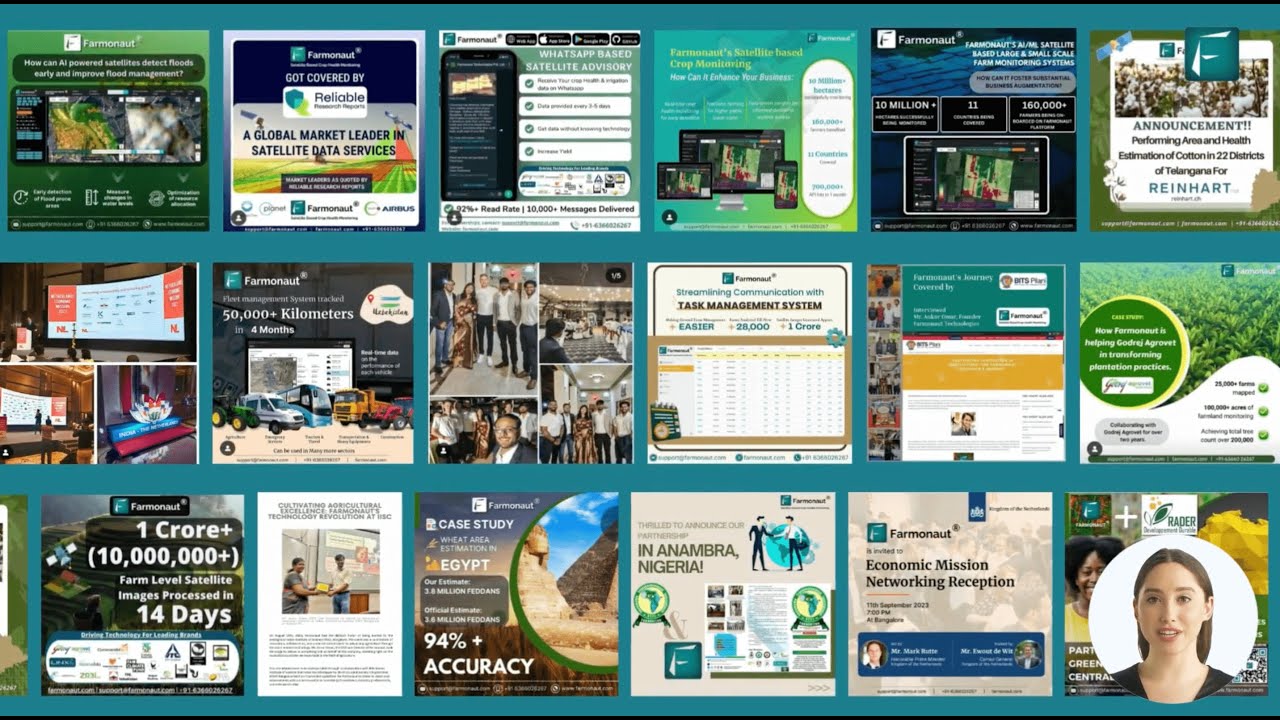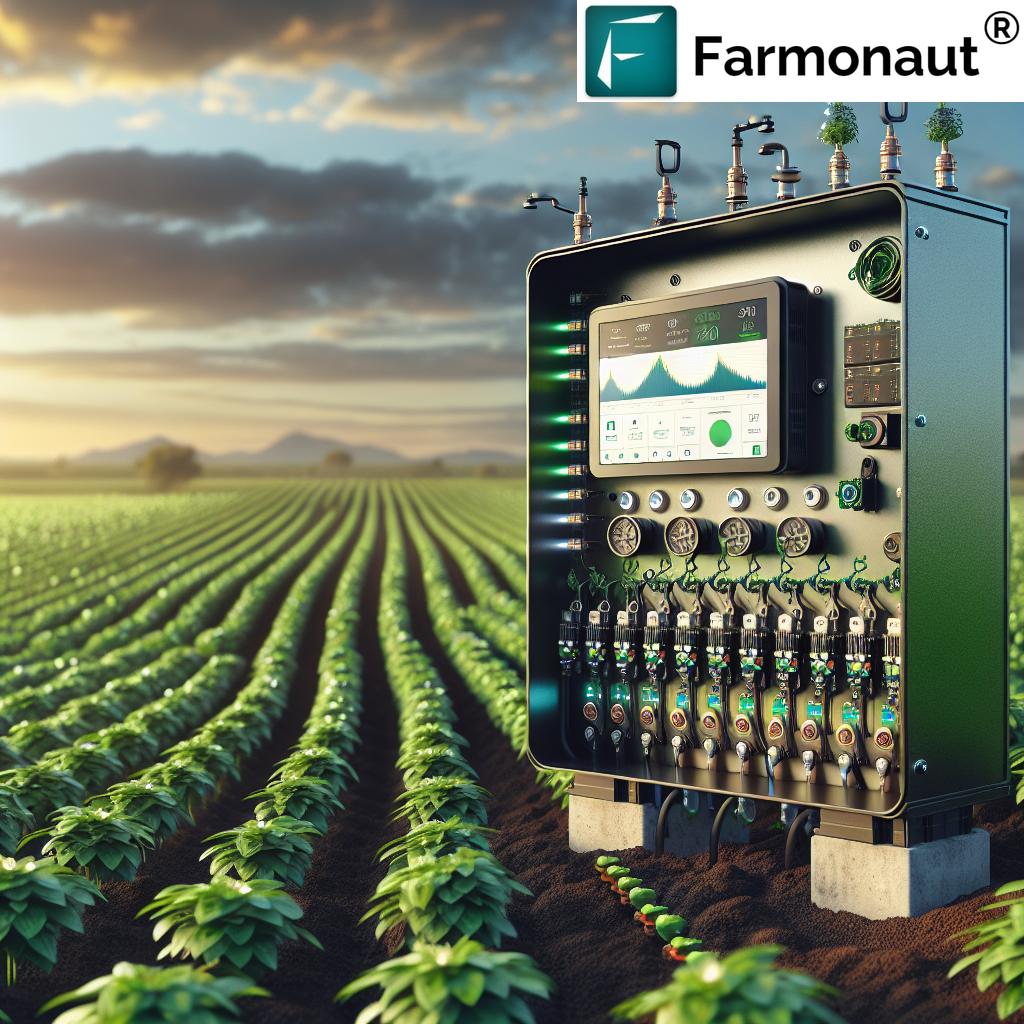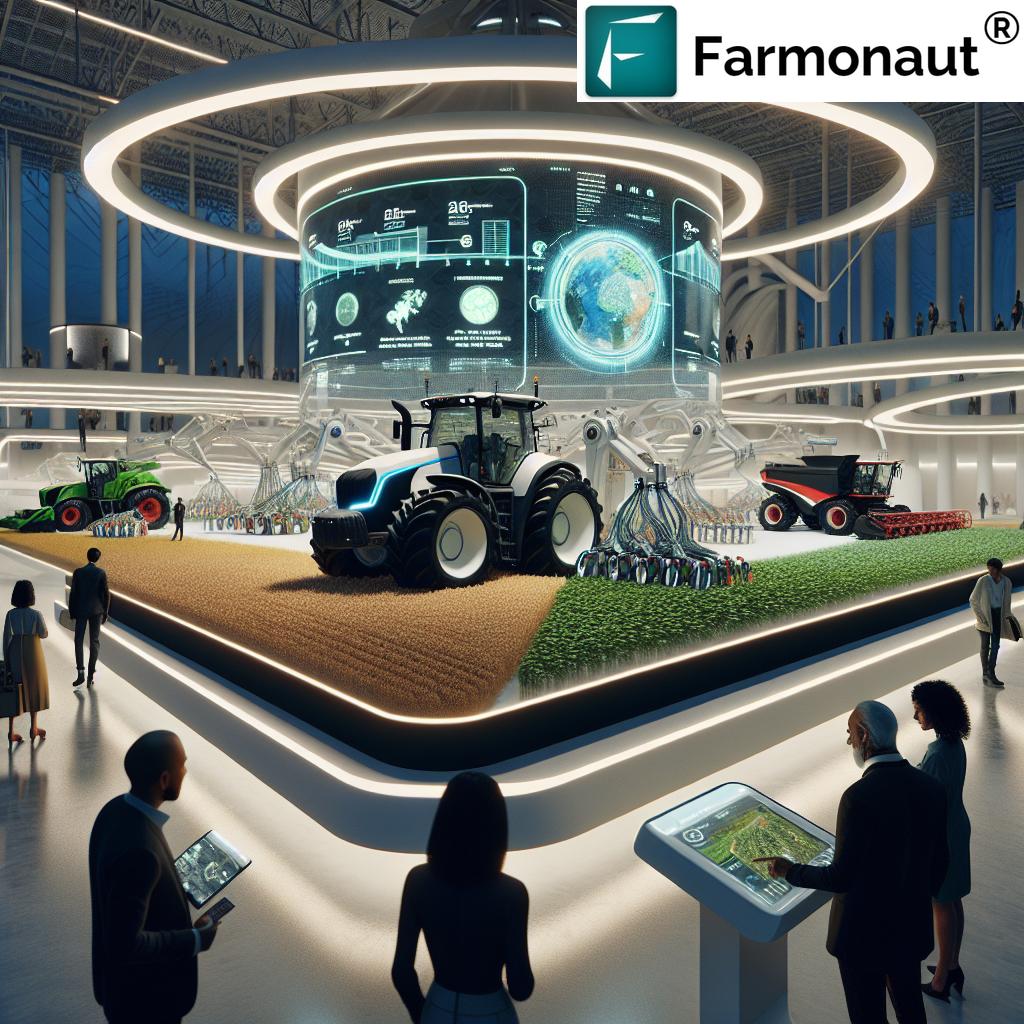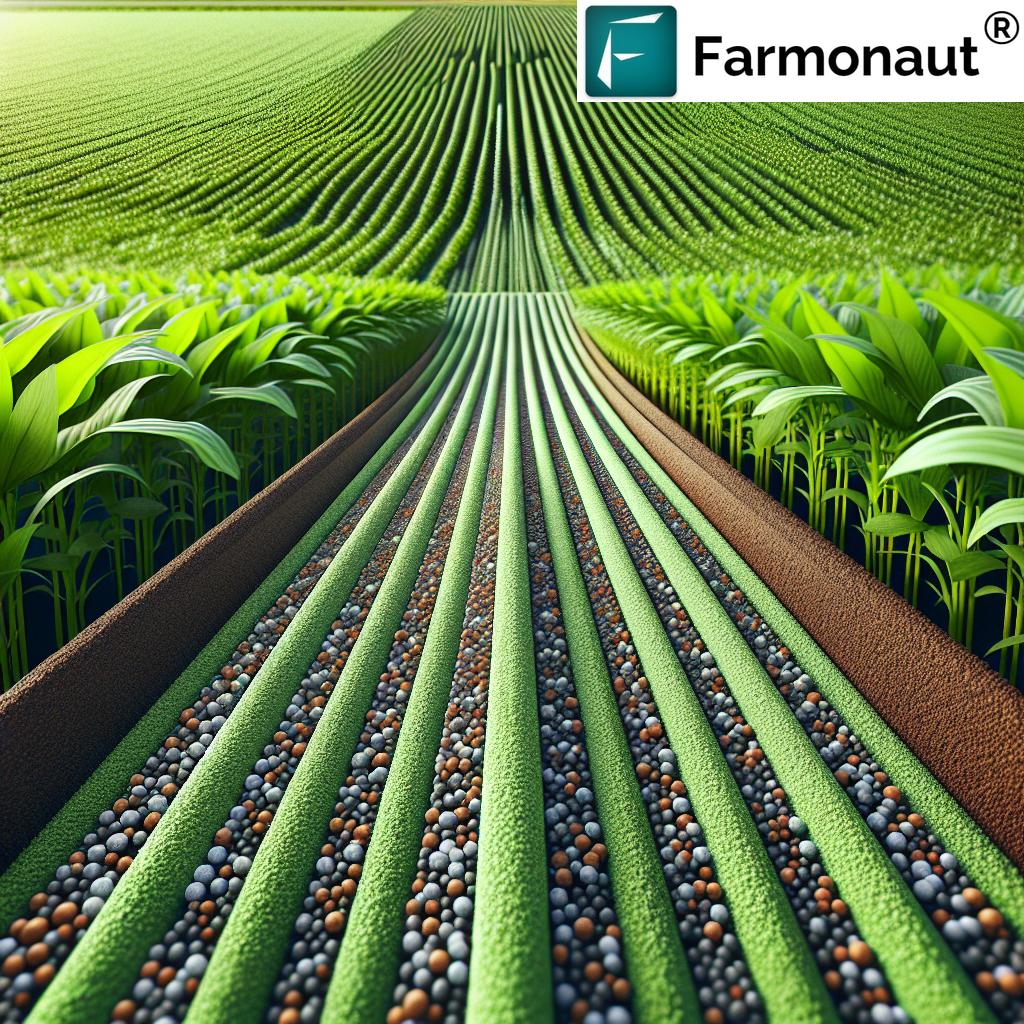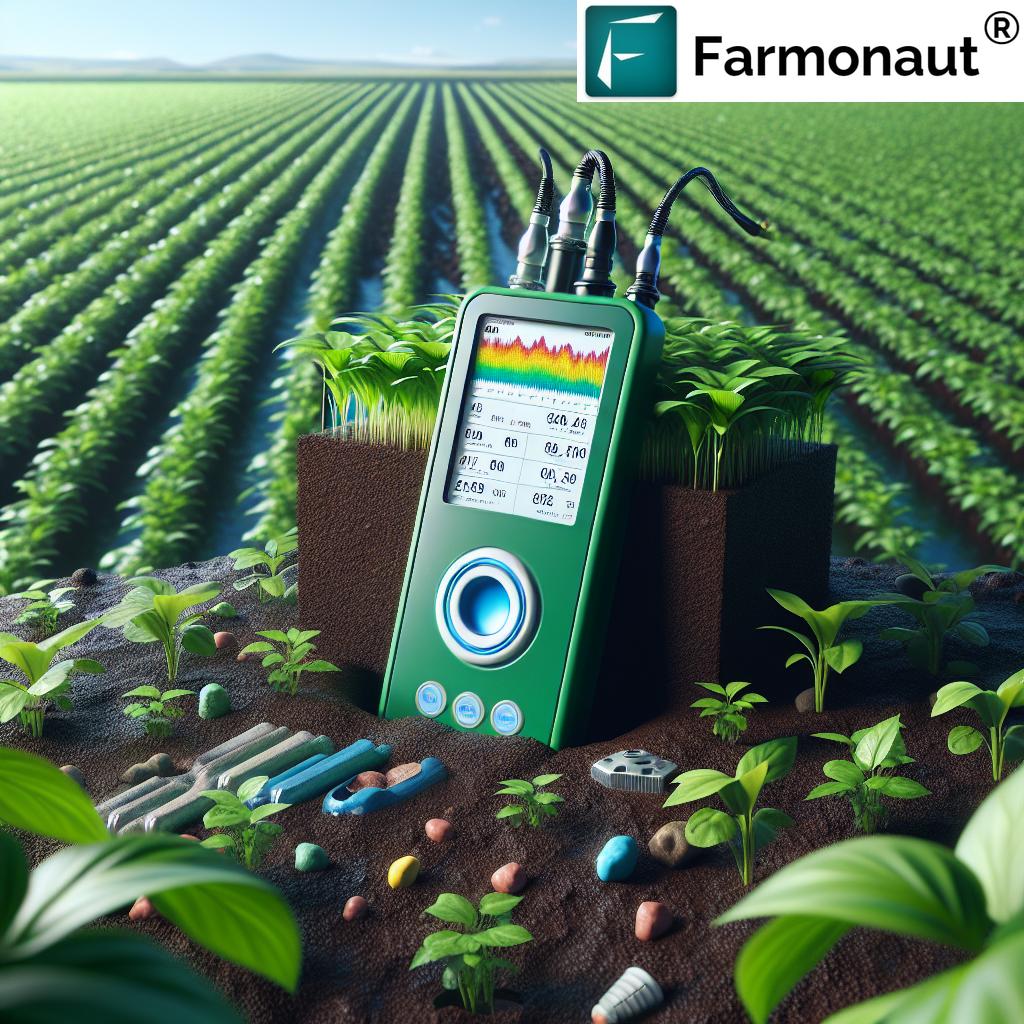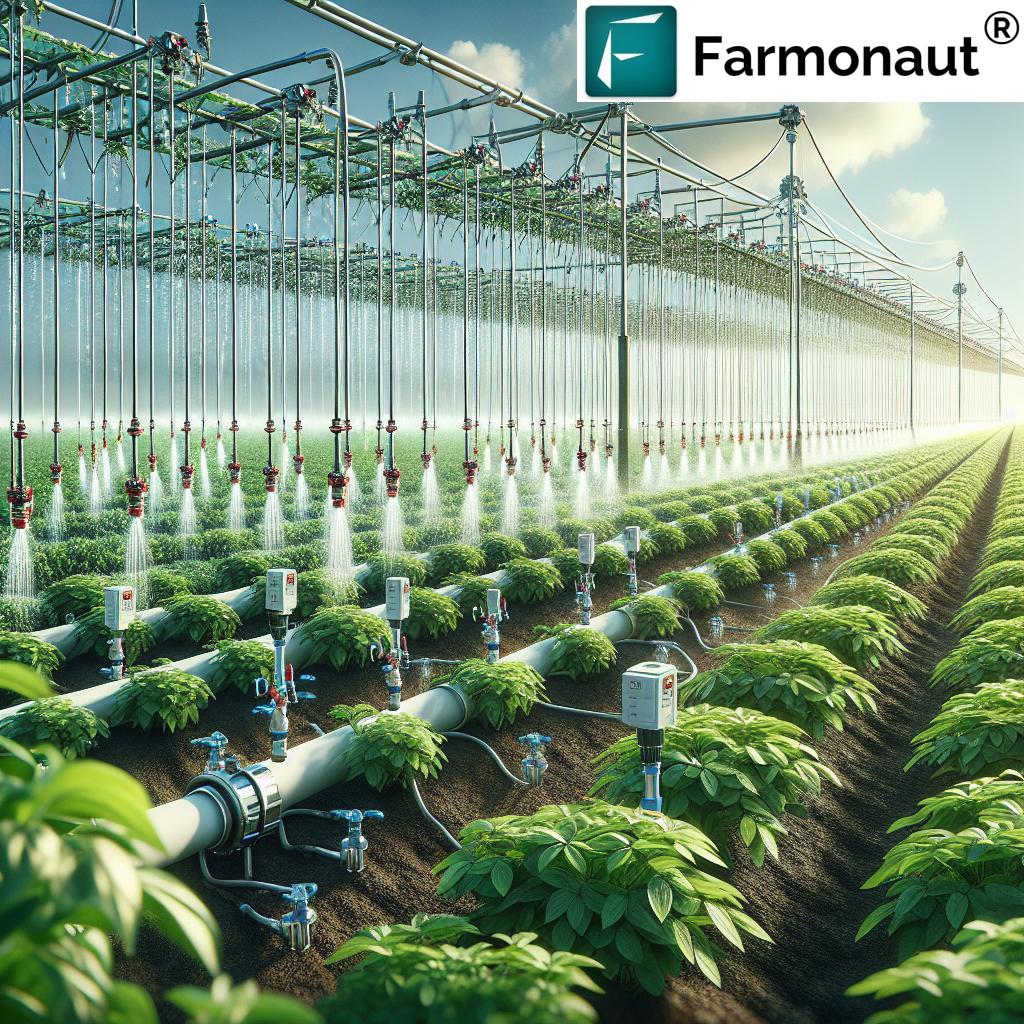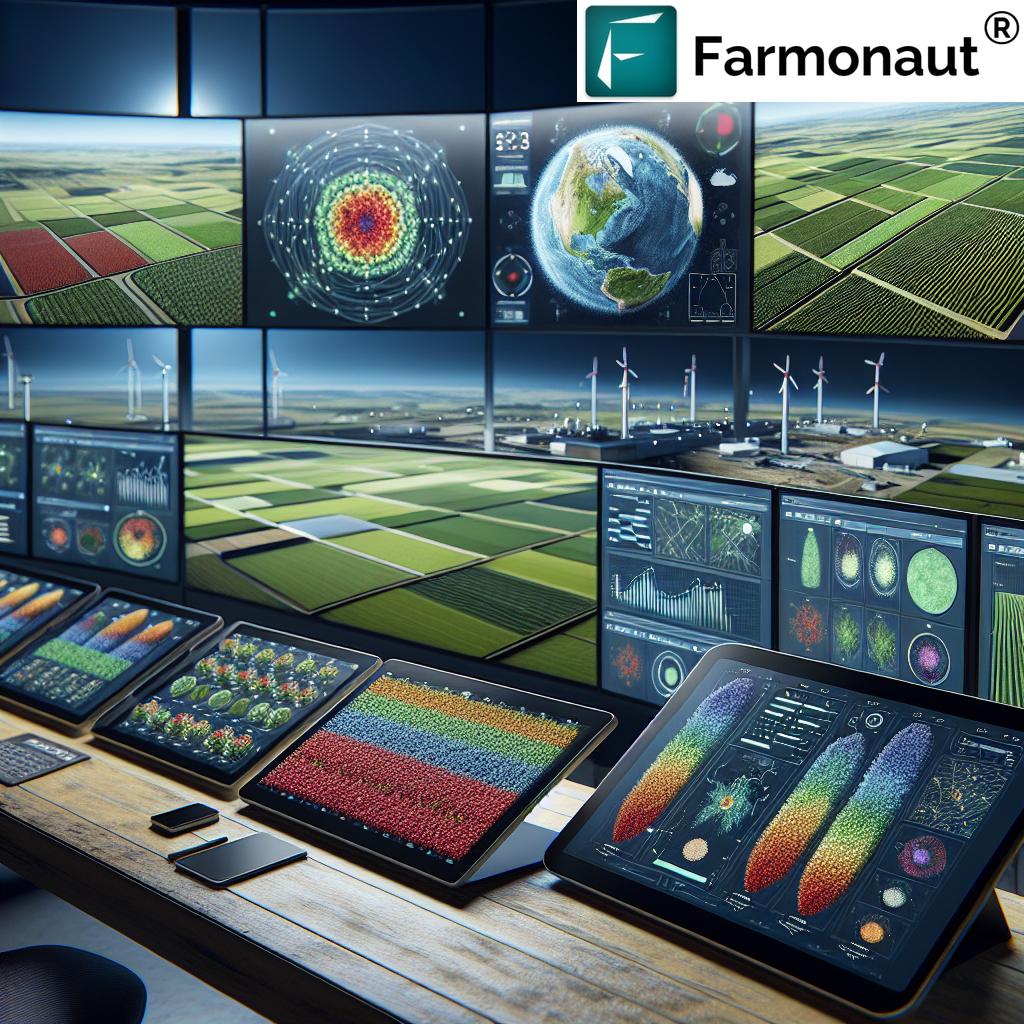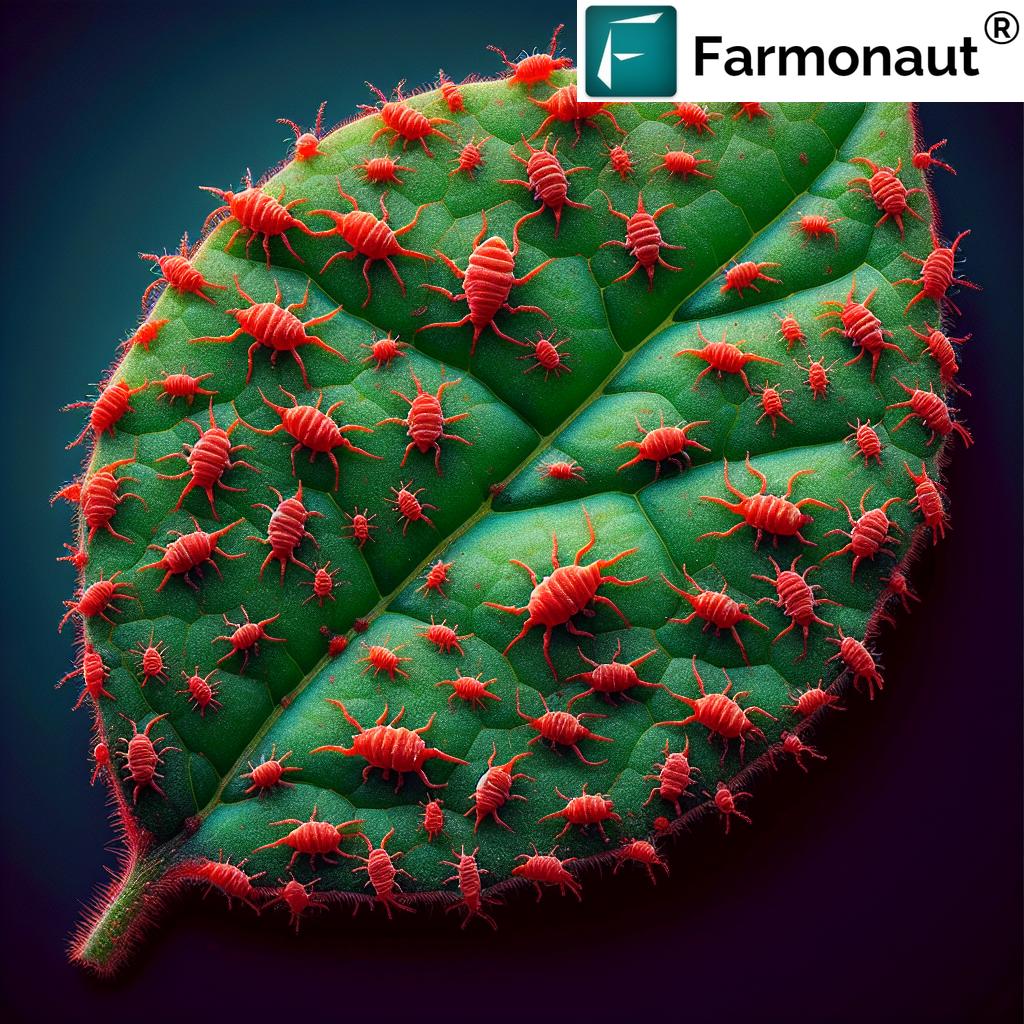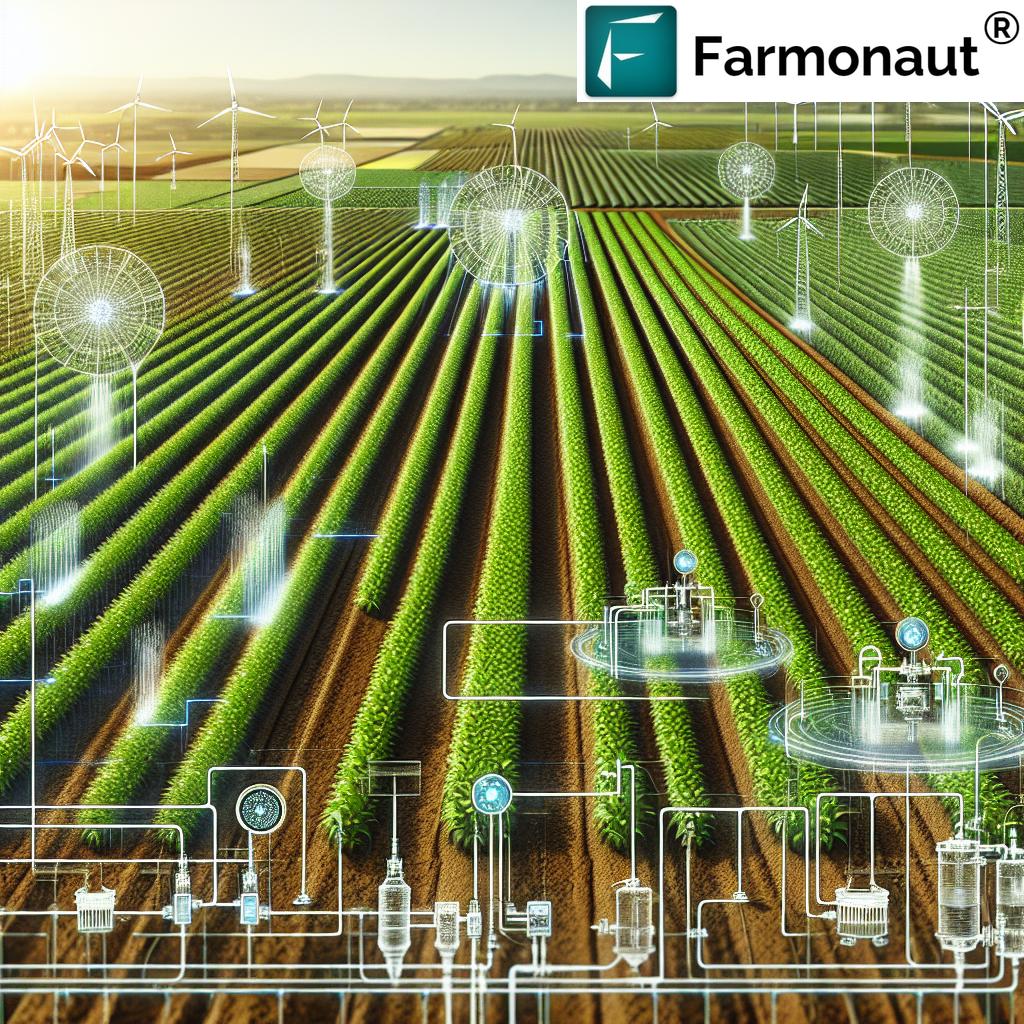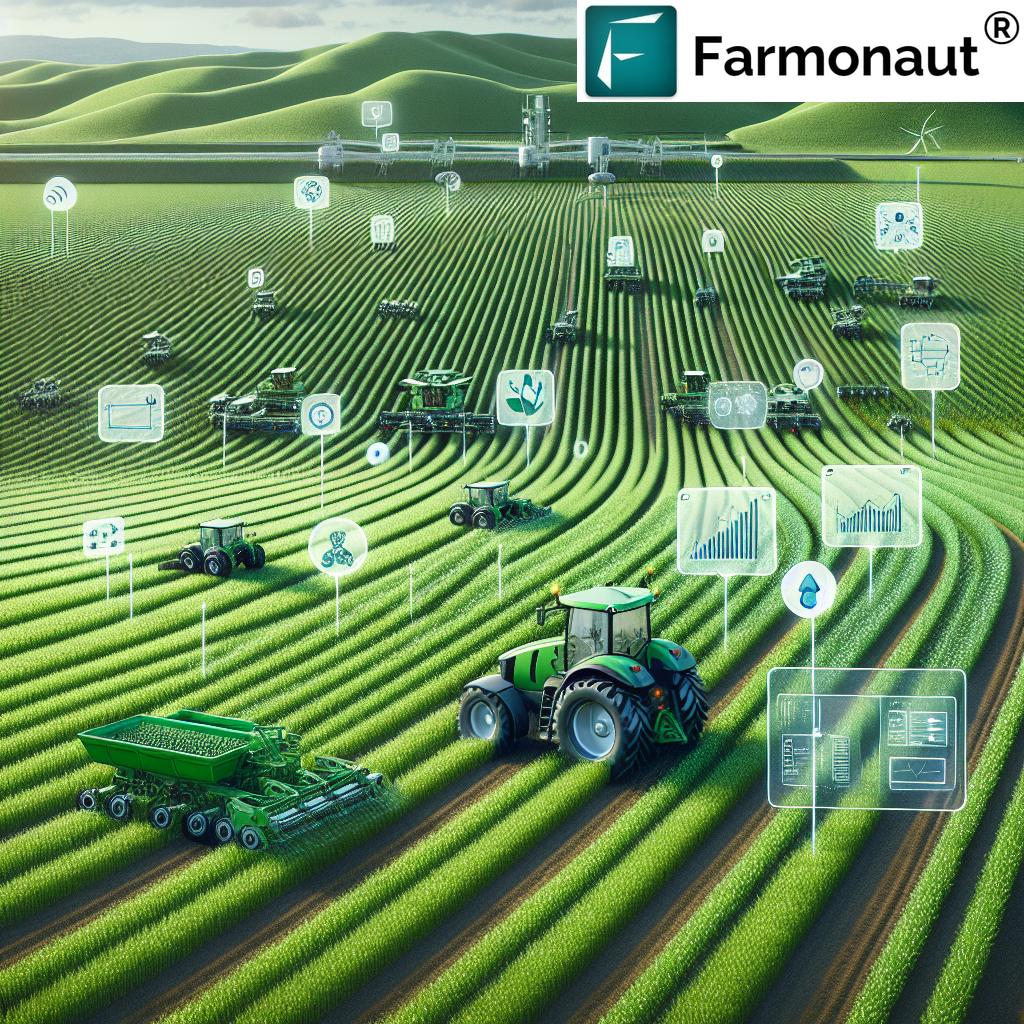Revolutionizing Sustainable Agriculture: How Precision Farming Technology Optimizes Crop Yields and Environmental Health
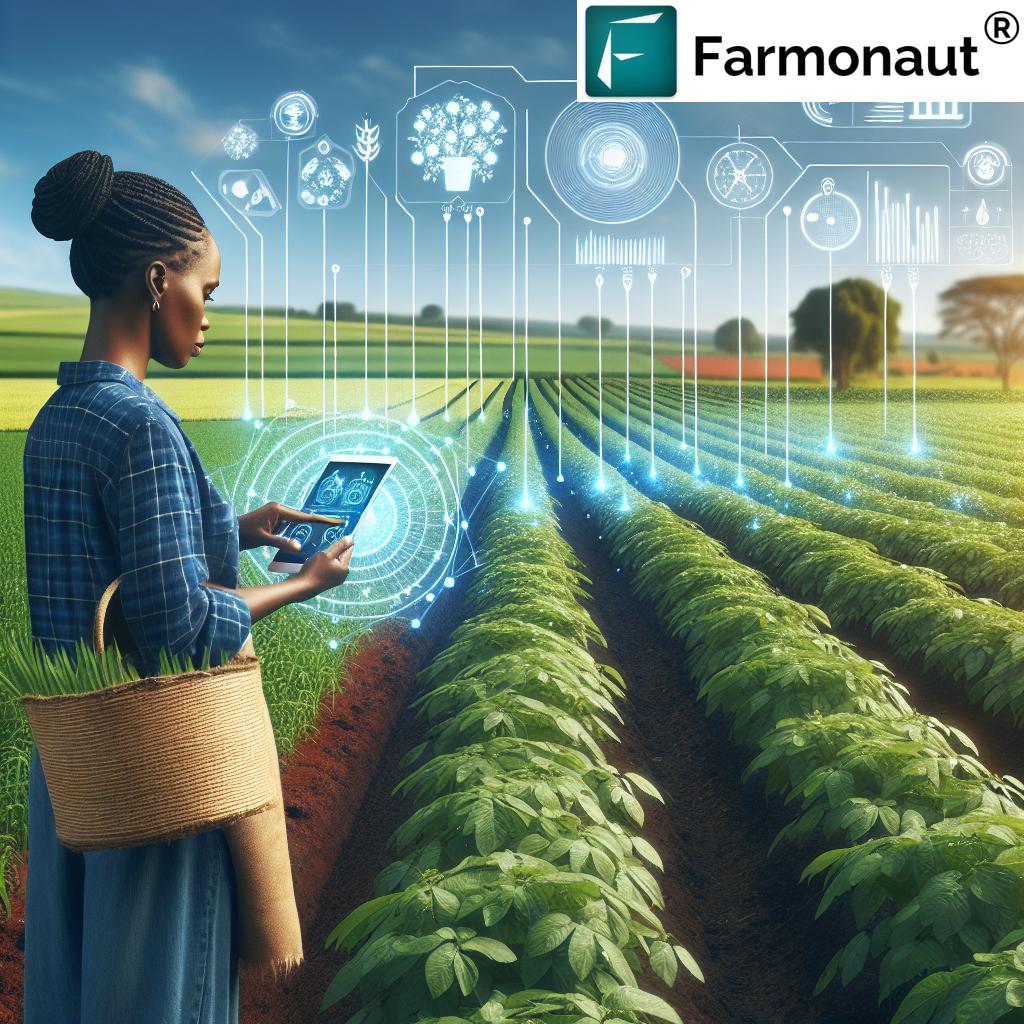
“Precision agriculture technology can reduce water usage by up to 30% while maintaining or improving crop yields.”
In the ever-evolving landscape of agriculture, we find ourselves at the cusp of a technological revolution that promises to transform the way we grow food and manage our natural resources. As we delve into the world of precision farming technology, we’ll uncover how these innovative solutions are not only optimizing crop yields but also promoting environmental health on an unprecedented scale.
The Dawn of Precision Agriculture
Precision agriculture technology has emerged as a game-changer in the farming industry. By harnessing the power of data analytics, satellite imagery, and advanced sensors, farmers can now make informed decisions about every aspect of their operations. This shift from traditional farming methods to smart farming solutions marks a significant leap towards sustainable and efficient agricultural practices.
At the forefront of this revolution is Farmonaut, a pioneering agricultural technology company that offers advanced, satellite-based farm management solutions. Through their android, iOS, and web applications, as well as their comprehensive API, Farmonaut is making precision agriculture accessible to farmers worldwide.
Explore Farmonaut’s innovative solutions:
Crop Monitoring Systems: The Eyes in the Sky
One of the most remarkable advancements in precision farming is the development of sophisticated crop monitoring systems. These systems utilize a combination of satellite imagery, drone technology, and ground-based sensors to provide real-time data on crop health, soil moisture levels, and other critical metrics.
Farmonaut’s satellite-based crop health monitoring service is a prime example of this technology in action. By analyzing multispectral satellite images, the platform provides farmers with invaluable insights into vegetation health (NDVI), soil moisture, and other key indicators. This data empowers farmers to make precise decisions about irrigation, fertilizer application, and pest management, ultimately leading to optimized crop yields and reduced resource wastage.
Agricultural Data Analytics: Turning Information into Action
The true power of precision agriculture lies in its ability to transform vast amounts of data into actionable insights. Agricultural data analytics platforms, like Farmonaut’s Jeevn AI Advisory System, process information from various sources to generate personalized recommendations for farmers.
These AI-driven systems analyze factors such as:
- Historical crop performance
- Weather patterns
- Soil composition
- Market trends
By integrating this information, farmers can make data-driven decisions that optimize their operations and increase profitability. The Jeevn AI system, for instance, provides real-time insights, weather forecasts, and expert crop management strategies tailored to each farm’s unique conditions.
Sustainable Farming Practices: Nurturing the Land
As we face the challenges of climate change and resource scarcity, sustainable farming practices have become more critical than ever. Precision agriculture technology plays a crucial role in promoting these practices by enabling farmers to use resources more efficiently and minimize their environmental impact.
Some key sustainable farming practices enabled by precision technology include:
- Variable rate application of fertilizers and pesticides
- Precision irrigation systems
- Targeted pest management
- Reduced soil compaction through optimized machinery routes
Farmonaut’s platform contributes to sustainability efforts by offering features like carbon footprint tracking. This allows agribusinesses to monitor their environmental impact in real-time and take steps towards reducing emissions and complying with environmental regulations.
Drone Technology in Agriculture: A Bird’s-Eye View
Drone technology has revolutionized field mapping and crop assessment, providing farmers with unprecedented visibility into their operations. These aerial vehicles, equipped with high-resolution cameras and multispectral sensors, can quickly survey large areas and collect detailed data on crop health, pest infestations, and soil conditions.
The benefits of drone technology in agriculture include:
- Rapid and accurate crop scouting
- Early detection of plant diseases and pest outbreaks
- Precise application of inputs through spot-spraying capabilities
- Creation of detailed 3D maps for better land management
While Farmonaut primarily focuses on satellite-based monitoring, the integration of drone data into their platform can provide even more granular insights for farmers seeking to optimize their operations.
Soil Health Management: The Foundation of Sustainable Agriculture
Maintaining healthy soil is fundamental to sustainable agriculture, and precision farming technologies are providing new tools for effective soil health management. Advanced sensors and analytics help farmers monitor key soil parameters such as:
- Nutrient levels
- pH balance
- Organic matter content
- Moisture retention
By understanding these factors in detail, farmers can implement targeted interventions to improve soil health, such as precision application of amendments or the use of cover crops. This not only enhances crop yields but also promotes long-term soil sustainability and carbon sequestration.
Farmonaut’s satellite-based monitoring can provide valuable insights into soil moisture levels and vegetation health, which are key indicators of overall soil condition. This information allows farmers to make informed decisions about soil management practices and optimize their use of resources.
Irrigation Optimization Tools: Every Drop Counts
Water scarcity is a growing concern in many agricultural regions, making efficient irrigation more important than ever. Precision agriculture offers sophisticated irrigation optimization tools that help farmers conserve water while maximizing crop yields.
These tools typically incorporate:
- Soil moisture sensors
- Weather data
- Crop water requirement models
- Automated irrigation systems
By integrating these elements, farmers can implement precise irrigation schedules that deliver the right amount of water at the right time, reducing waste and improving crop health.
Farmonaut’s platform contributes to irrigation optimization by providing real-time data on soil moisture levels derived from satellite imagery. This information, combined with weather forecasts and crop-specific data, enables farmers to make informed decisions about when and how much to irrigate.
“Advanced yield prediction models can forecast crop production with over 90% accuracy, enhancing farm planning and profitability.”
Farm Management Software: Streamlining Operations
Modern farm management software is the central nervous system of precision agriculture, integrating data from various sources and providing a comprehensive platform for decision-making. These sophisticated tools offer features such as:
- Field mapping and planning
- Inventory management
- Equipment tracking
- Financial analysis
- Compliance reporting
Farmonaut’s platform exemplifies the power of integrated farm management software. By combining satellite-based crop monitoring with AI-driven advisory services and blockchain-based traceability solutions, Farmonaut offers a comprehensive suite of tools for modern farm management.
Discover Farmonaut’s API capabilities: Farmonaut Satellite & Weather API
For developers, explore the API documentation: Farmonaut API Developer Docs
Yield Prediction Models: Forecasting Success
Accurate yield prediction is crucial for farm planning, resource allocation, and market strategizing. Advanced yield prediction models leverage historical data, current crop conditions, weather forecasts, and machine learning algorithms to provide highly accurate yield estimates.
The benefits of these models include:
- Improved crop planning and rotation strategies
- Optimized harvest timing
- Better management of storage and transportation logistics
- Enhanced ability to negotiate contracts and prices
While Farmonaut doesn’t explicitly mention yield prediction models, their comprehensive data collection and analysis capabilities provide a strong foundation for developing such predictive tools in the future.
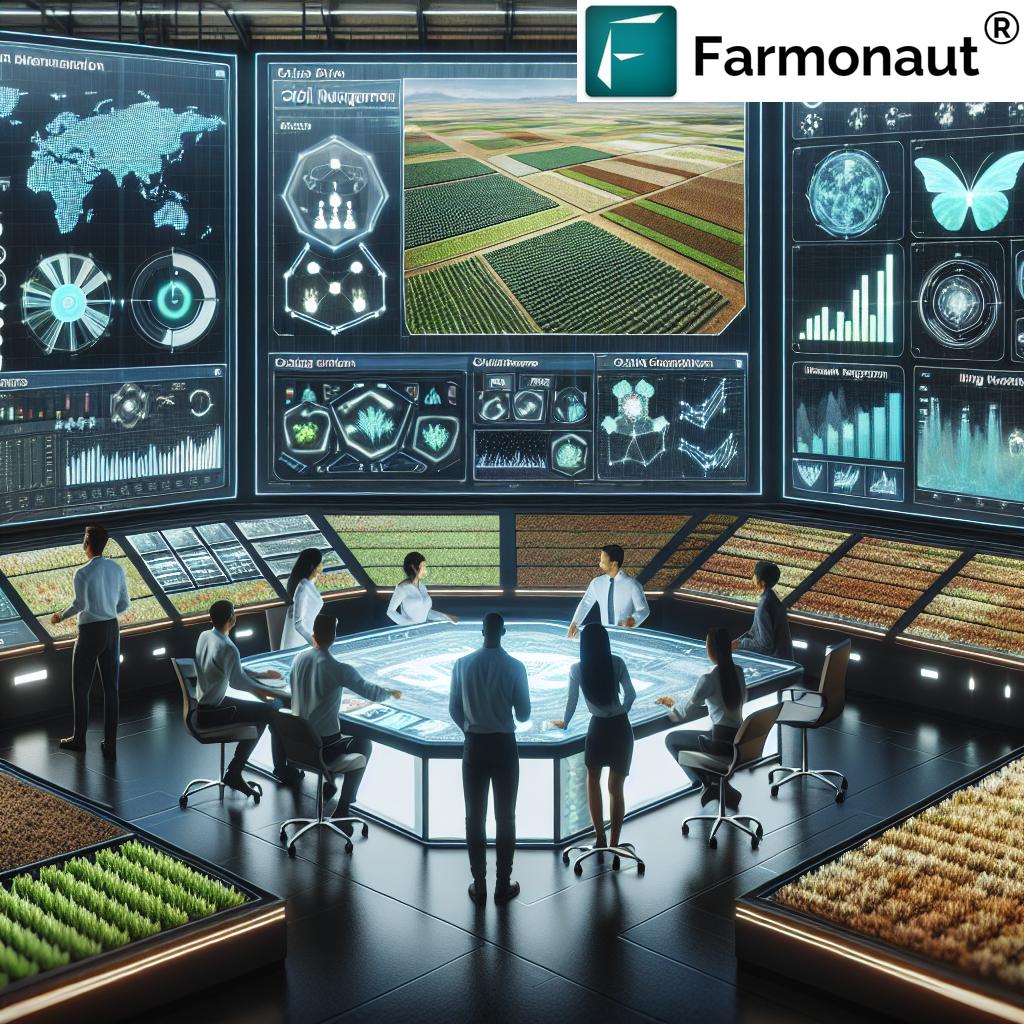
The Future of Farming: Technology and Sustainability Converge
As we look to the future, the convergence of technology and sustainability in agriculture holds immense promise for addressing global food security challenges. Emerging trends in this space include:
- Integration of AI and machine learning for more sophisticated predictive analytics
- Expansion of IoT (Internet of Things) networks for real-time farm monitoring
- Development of autonomous farm machinery guided by precision data
- Increased use of vertical farming and controlled environment agriculture
- Advanced biotechnology for crop resilience and nutrition enhancement
Farmonaut is well-positioned to play a significant role in this future, with its focus on accessible precision agriculture solutions and continuous innovation in satellite-based monitoring and AI-driven advisory services.
Comparative Analysis: Traditional vs. Precision Farming
To fully appreciate the impact of precision farming technology, let’s compare traditional farming methods with modern precision agriculture approaches:
| Farming Aspect | Traditional Method | Precision Farming Method | Environmental Impact |
|---|---|---|---|
| Irrigation | Scheduled, uniform watering | Variable rate irrigation based on soil moisture sensors and weather data | 30% water savings |
| Fertilizer Application | Blanket application across fields | Targeted application based on soil nutrient maps and crop needs | 25% reduction in chemical use |
| Pest Management | Regular, broad-spectrum pesticide application | Integrated Pest Management with targeted interventions | 40% reduction in pesticide use |
| Crop Monitoring | Manual field scouting | Satellite and drone-based monitoring with AI analysis | Early detection of issues, reducing crop losses by 20% |
| Yield Prediction | Based on historical averages and visual assessment | AI-driven models using multiple data points | Improved resource allocation, reducing waste by 15% |
This comparison clearly illustrates the significant advantages of precision farming in terms of resource efficiency and environmental impact. Platforms like Farmonaut are instrumental in making these advanced techniques accessible to farmers of all scales.
Challenges and Considerations
While the benefits of precision agriculture are clear, there are challenges to consider in its widespread adoption:
- Initial investment costs for technology and equipment
- Need for digital literacy and training among farmers
- Data privacy and security concerns
- Ensuring equitable access to technology for small-scale farmers
- Integration with existing farm practices and equipment
Farmonaut addresses some of these challenges by offering affordable, subscription-based access to advanced satellite monitoring and AI advisory services, making precision agriculture more accessible to a wider range of farmers.
The Role of Policy and Collaboration
To fully realize the potential of precision agriculture in creating a more sustainable and efficient farming ecosystem, supportive policies and collaborative efforts are essential. Key areas for focus include:
- Government incentives for adoption of sustainable farming technologies
- Investment in rural broadband infrastructure to support digital agriculture
- Public-private partnerships for research and development in agritech
- Educational programs to build digital skills in rural communities
- International cooperation on data standards and interoperability
Companies like Farmonaut play a crucial role in this ecosystem by providing the technological tools and platforms that enable precision agriculture. Their efforts in making these technologies accessible and user-friendly contribute significantly to the broader adoption of sustainable farming practices.
Conclusion: A Sustainable Agricultural Revolution
As we’ve explored throughout this blog, precision farming technology is at the forefront of a sustainable agricultural revolution. By optimizing crop yields, conserving resources, and promoting environmental health, these innovative solutions are paving the way for a more resilient and productive farming future.
Farmonaut’s comprehensive suite of satellite-based monitoring tools, AI-driven advisory services, and blockchain-enabled traceability solutions exemplify the potential of precision agriculture to transform farming practices. As these technologies continue to evolve and become more accessible, we can look forward to a future where sustainable, high-yield agriculture is the norm rather than the exception.
The journey towards this future requires ongoing innovation, collaboration, and a commitment to sustainable practices. By embracing precision farming technologies and platforms like Farmonaut, farmers, agribusinesses, and policymakers can work together to address global food security challenges while preserving our planet’s precious resources for generations to come.
Frequently Asked Questions (FAQ)
- Q: What is precision agriculture?
A: Precision agriculture is an approach to farm management that uses information technology and a wide array of items such as GPS guidance, control systems, sensors, robotics, drones, autonomous vehicles, variable rate technology, GPS-based soil sampling, automated hardware, telematics, and software to optimize returns on inputs while preserving resources. - Q: How does satellite-based crop monitoring work?
A: Satellite-based crop monitoring uses multispectral satellite images to analyze vegetation health, soil moisture, and other crop parameters. These images are processed using advanced algorithms to provide insights into crop conditions, allowing farmers to make informed decisions about irrigation, fertilization, and pest management. - Q: What are the benefits of using precision farming technologies?
A: Benefits include increased crop yields, reduced input costs, improved resource efficiency (water, fertilizers, pesticides), better farm planning, enhanced environmental sustainability, and increased profitability. - Q: How does Farmonaut’s platform contribute to sustainable agriculture?
A: Farmonaut’s platform offers satellite-based crop health monitoring, AI-driven advisory services, and carbon footprint tracking. These tools help farmers optimize resource use, reduce environmental impact, and make data-driven decisions that promote sustainable farming practices. - Q: Is precision agriculture only for large-scale farms?
A: No, while initially more common on large farms, precision agriculture technologies are becoming increasingly accessible to small and medium-sized farms. Companies like Farmonaut offer affordable, scalable solutions that can benefit farms of all sizes.
Explore Farmonaut’s Subscription Options
By leveraging Farmonaut’s advanced satellite-based farm management solutions, farmers can take a significant step towards optimizing their operations and embracing sustainable agriculture. Whether you’re managing a small family farm or overseeing large-scale agricultural operations, Farmonaut’s technology can help you make more informed decisions, improve crop yields, and contribute to a more sustainable future for agriculture.








